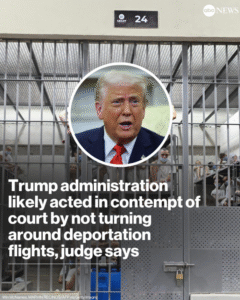A federal judge has determined that the Trump administration likely acted in contempt of court after it failed to comply with an order to stop deportation flights and return those already in progress. The controversy stems from the use of the Alien Enemies Act to deport more than 260 Venezuelan nationals to El Salvador. Judge James Boasberg issued a temporary restraining order on March 15, 2025, explicitly directing the administration to halt these deportations and turn back any flights that were already en route.
Despite the order, the administration allowed at least one deportation flight to proceed, claiming that the order did not explicitly cover planes that were already in the air. In court, lawyers for the government argued that the judge’s verbal instructions were ambiguous and that they had acted in good faith based on the written language of the order. However, Judge Boasberg firmly rejected that argument, stating that the administration had shown “willful disobedience” of a lawful court order.
Boasberg said during a hearing that the executive branch does not have the authority to unilaterally decide when and how to follow court orders. “No one is above the law, and that includes government officials,” Boasberg said. “The judiciary’s authority cannot be treated as a suggestion.” He went on to warn that if the Department of Justice declined to prosecute the officials responsible, he would appoint an independent attorney to handle contempt proceedings.
The judge’s rebuke comes amid growing legal scrutiny of the Trump administration’s immigration tactics, which have been widely criticized for bypassing established asylum processes and fast-tracking deportations. Legal experts say this case could set an important precedent for how the courts can respond when the executive branch defies orders.
The deported Venezuelans were sent to El Salvador under a controversial program that allows the U.S. to deport foreign nationals who are deemed a security risk during times of national emergency. Critics say this program has been abused to bypass due process and remove asylum seekers before their cases are heard.
Immigration advocates celebrated the judge’s statement, calling it a “rare moment of accountability.” “For years, immigration enforcement has operated in the shadows with little oversight,” said Andrea Morales, an attorney with a nonprofit representing several of the deported individuals. “This ruling sends a powerful message that the rule of law must prevail.”
Meanwhile, a spokesperson for the Trump campaign insisted the administration acted appropriately. “The judge’s order was vague and issued under questionable authority,” the spokesperson said. “We will appeal this decision and continue defending the rights of the American people.”
With a possible contempt prosecution now on the table, legal observers say this case could evolve into a significant test of the separation of powers. Judge Boasberg has scheduled a follow-up hearing in early May to determine whether to formally initiate contempt proceedings and possibly refer the matter to a special prosecutor. The Justice Department has yet to comment on whether it will pursue charges.
